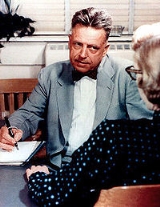
Alfred Kinsey
Alfred Charles Kinsey, PhD (1894-06-23 - 1956-08-25) was a sex researcher, entomologist and zoologist who foundeed the Institute for Sex Research at Indiana University at Bloomington (now called the Kinsey Institute for Research in Sex, Gender and Reproduction).
Sexual Behaviour in the Human Male (1948)
- The history of medicine proves that in so far as man seeks to know himself and face his whole nature, he has become free from bewildered fear, despondent shame, or arrant hypocrisy. As long as sex is dealt with in the current confusion of ignorance and sophistication, denial and indulgence, suppression and stimulation, punishment and exploitation, secrecy and display, it will be associated with a duplicity and indecency that lead neither to intellectual honesty nor human dignity.
- Males do not represent two discrete populations, heterosexual and homosexual. The world is not to be divided into sheep and goats. Not all things are black nor all things white. It is a fundamental of taxonomy that nature rarely deals with discrete categories. Only the human mind invents categories and tries to force facts into separated pigeon-holes. The living world is a continuum in each and every one of its aspects. The sooner we learn this concerning human sexual behavior, the sooner we shall reach a sound understanding of the realities of sex.
- The very general occurrence of the homosexual in ancient Greece, and its wide occurrence today in some cultures in which such activity is not taboo suggests that the capacity of an individual to respond erotically to any sort of stimulus, whether it is provided by another person of the same or opposite sex, is basic in the species.
Sexual Behavior in the Human Female (1953)
- It cannot be too frequently emphasized that the behavior of any animal must depend upon on the nature of the stimulus which it meets, its anatomic and physiologic capacities, and its background of previous experience. Unless it has been conditioned by previous experience, an animal should respond identically to identical stimuli, whether they emanate from some part of its own body, from another individual of the same sex, or from an individual of the opposite sex.
- The inherent physiologic capacity of an animal to respond to any sufficient stimulus seems, then, the basic explanation of the fact that some individuals respond to stimuli originating in other individuals of their own sex-and it appears to indicate that every individual could so respond if the opportunity offered and one were not conditioned against making such responses. There is no need of hypothesizing peculiar hormonal factors that make certain individuals especially liable to engage in homosexual activity, and we know of no data which prove the existence of hormonal factors (p. 758). There are no sufficient data to show that specific hereditary factors are involved. Theories of childhood attachments to one or the other parent, theories of fixation at some infantile level of sexual development, interpretations of homosexuality as neurotic or psychopathic behavior or moral degeneracy, and other philosophic interpretations are not supported by scientific research, and are contrary to the specific data on our series of female and male histories.
- The impression that infra-human mammals more or less confine themselves to heterosexual activities is a distortion of the fact which appears to have originated in a man-made philosophy, rather than in specific observations of mammalian behavior. Biologists and psychologists who have accepted the doctrine that the only natural function of sex is reproduction, have simply ignored the existence of sexual activity which is not reproductive. They have assumed that heterosexual responses are a part of an animal's innate, "instinctive" equipment, and that all other types of sexual activity represent "perversions" of the "normal instincts". Such interpretations are, however, mystical. They do not originate in our knowledge of the physiology of sexual response (Chapter 15), and can be maintained only if one assumes that sexual function is in some fashion divorced from the physiologic processes which control other functions of the animal body.
- The mammalian record thus confirms our statement that any animal which is not too strongly conditioned by some special sort of experience is capable of responding to any adequate stimulus. This is what we find in the more uninhibited segments of our human species, and this is what we find among young children who are not too rigorously restrained in their early sex play. Exclusive preferences and patterns of behavior, heterosexual or homosexual, come only with experience, or as a result of social pressures which tend to force an individual into an exclusive pattern of one or the other sort. Psychologists and psychiatrists, reflecting the mores of the culture in which they have been raised, have spent a good deal of time trying explain the origins of homosexual activity; but considering the physiology of sexual response and the mammalian backgrounds of human behavior, it is not so difficult to explain why a human animal does a particular thing sexually. It is more difficult to explain why each and every individual is not involved in every type of sexual activity.
Quotes about Alfred Kinsey
- If Kinsey is right, I have only done what comes naturally, what the average American does secretly, drenching himself in guilt fixations and phobias because of his sense of sinning. I have never felt myself a sinner or committed what I would call a sin.
- Mae West
- Alfred Kinsey was a very strange man. He was repressed sexually until quite a late age, and then expressed his sexuality in more and more bizarre forms as he grew older. His was a classic case of the appetite increasing with the feeding. Once you are on the treadmill of exploring sensation as the key to contentment, you have to experience more and more extreme things. I think this explains the logic of artistic production and how 'transgressive' becomes a term of praise.
